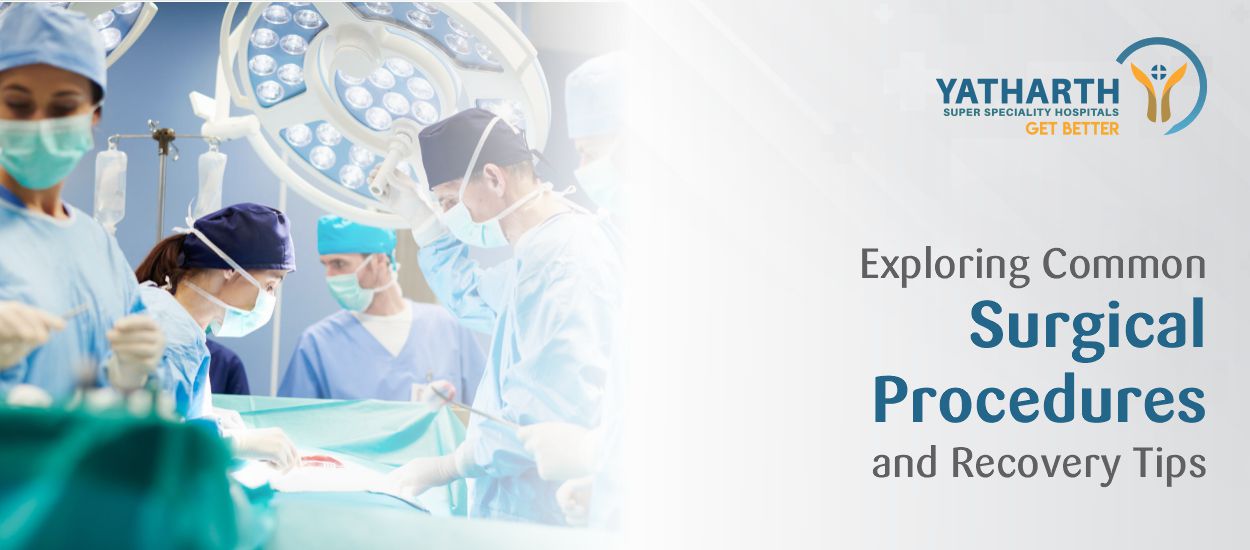Undergoing surgery can be a daunting experience, but understanding the standard surgical procedures and being prepared can help alleviate anxiety. This blog will explore common surgical procedures, discuss how to prepare for surgery, delve into the surgical process, provide post-surgical recovery tips, and highlight potential risks and complications. Whether you're considering surgery or supporting someone through the process, this blog will provide valuable insights.
Common Surgical Procedures
Appendectomy: The removal of the appendix due to appendicitis.
Cholecystectomy: The removal of the gallbladder, often due to gallstones or gallbladder disease.
Hernia repair: Surgical correction of a hernia, which occurs when an organ or tissue pushes through a weak spot in the abdominal wall.
Mastectomy: The surgical removal of one or both breasts, typically as a treatment for breast cancer.
Joint replacement: Surgical intervention to replace damaged or arthritic joints, such as the hip or knee.
Cataract surgery: The removal and replacement of a clouded lens in the eye to restore vision.
Cesarean section: Surgical delivery of a baby through an incision in the mother's abdomen and uterus.
Preparing for Surgery
- Consultation with a surgeon: Schedule a consultation with a skilled and experienced surgeon to discuss the procedure, ask questions, and address any concerns.
- Pre-operative testing: Your surgeon may order various tests, such as blood work and imaging, to assess your overall health and ensure you're fit for surgery.
- Medication and dietary adjustments: Follow your surgeon's instructions regarding any necessary adjustments to medications and dietary restrictions before the surgery.
- Arrange support: Enlist the help of family or friends for transportation and support during the recovery period.
- Preparing your home: Make your home recovery-friendly by arranging necessary supplies, creating a comfortable resting space, and ensuring clear pathways.
The Surgical Process
- Anaesthesia: You will receive anaesthesia to ensure you are comfortable and pain-free during the procedure. The type of anaesthesia administered will depend on the surgery and your medical condition.
- Incision and procedure: The surgeon will make an incision to access the affected area and perform the necessary procedure.
- Monitoring and care: Throughout the surgery, the surgical team will closely monitor your vital signs and ensure your safety.
- Closing the incision: Once the procedure is complete, the surgeon will close the incision using sutures, staples, or adhesive strips.
- Recovery room: After surgery, you will be taken to a recovery room where medical professionals will monitor your initial recovery.
Post-Surgical Recovery Tips
- Follow post-operative instructions: Adhere to your surgeon's post-operative instructions regarding wound care, medication, physical activity, and dietary restrictions.
- Rest and recuperate: Give yourself ample time to rest and allow your body to heal. Avoid strenuous activities and gradually increase physical activity as advised.
- Pain management: Take prescribed pain medications as directed and use other pain management techniques such as ice packs or heat therapy.
- Proper nutrition: Maintain a balanced diet that includes essential nutrients to support healing and boost your immune system.
- Emotional support: Seek emotional support from loved ones or consider joining support groups to cope with any emotional challenges during the recovery process.
Potential Risks and Complications
While surgical procedures are generally safe, it's imperative to be aware of potential complications and hazards. These can include infections, bleeding, adverse reactions to anaesthesia, blood clots, and slow wound healing. However, the expertise of skilled general surgeons along with proper pre-and post-operative care, significantly reduces the likelihood of complications.
Conclusion
Understanding common surgical procedures and preparing for surgery can help ease anxiety and facilitate a smoother recovery process. By following the guidance of experienced general and laparoscopic surgeons adhering to post-operative instructions, and taking care of yourself during recovery, you can optimize the healing process and regain your health and well-being. Remember to consult your surgeon for personalized advice and support throughout your surgical journey.
FAQs
1. What are the steps involved in preparing for surgery?
The steps involved in preparing for surgery include consulting with a surgeon, undergoing pre-operative testing, making necessary medication and dietary adjustments, arranging support for the recovery period, and preparing your home environment.
2. How long does it typically take to recover from common surgical procedures?
The recovery time for common surgical procedures can vary depending on the type of surgery, individual factors, and the complexity of the procedure. It is best to consult with your surgeon for an estimated recovery timeline.
3. What can I do to minimize the risk of complications during my surgical recovery?
To minimize the risk of complications during surgical recovery, it is important to strictly follow your surgeon's post-operative instructions, take prescribed medications as directed, practice good hygiene, avoid strenuous activities, and attend all follow-up appointments.
4. Are there any specific dietary restrictions or recommendations after surgery?
After surgery, specific dietary restrictions or recommendations may vary depending on the type of procedure and individual needs. Your surgeon or a registered dietitian will provide guidance on any necessary dietary modifications, such as limiting certain foods, increasing fluid intake, or focusing on nutrient-dense meals.
5. How can I manage pain and discomfort during the post-surgical recovery period?
Managing pain and discomfort during the post-surgical recovery period can involve taking prescribed pain medications as directed, using ice packs or heat therapy, practicing gentle movement and stretching exercises as advised, and engaging in deep breathing and other relaxation techniques such as guided imagery. It is important to consult with your surgeon for personalized pain management strategies.















